The question on many minds is, “Do air purifiers work?” Let me give you straight answer “YES“. Yet, as with any technological solutions, air purifiers have their limitations and potential drawbacks. Air purifiers have gained popularity as a solution to improve indoor air quality and alleviate respiratory issues caused by pollutants and allergens. Let’s go into the details to understand their effectiveness and how they function to clean the air we breathe.
Beyond the technology, we’ll also delve into the benefits air purifiers offer and how they can transform the quality of the air we breathe indoors. From reducing allergens to mitigating the spread of airborne illnesses, these devices claim to provide a myriad of advantages. We will also discuss limitations and will guide you to make informed decisions about incorporating air purifiers into your daily life.
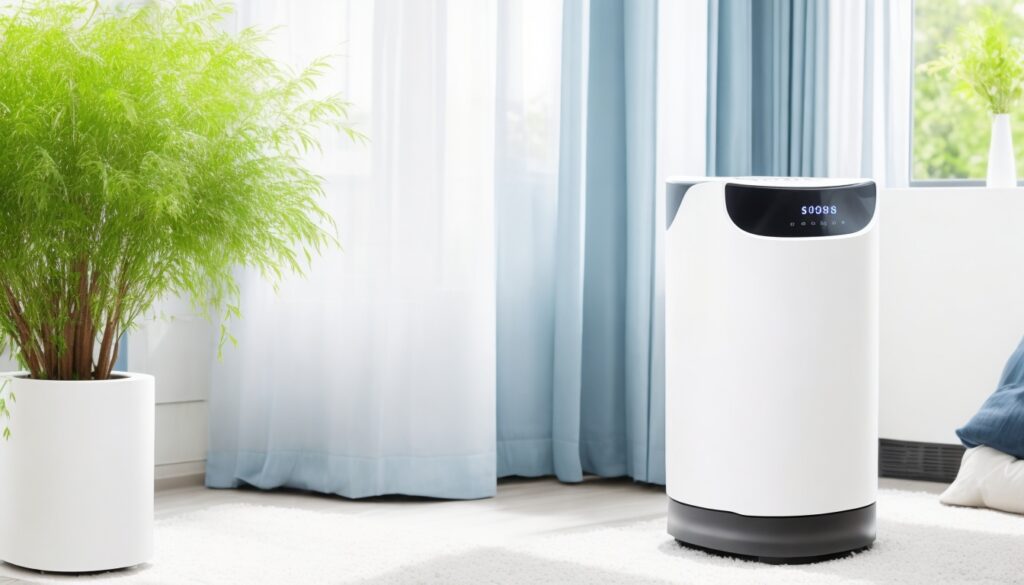
Understanding Indoor Air Pollution
Before we answer the question “Do Air Purifiers Work” and effectiveness of air purifiers, it’s important to ubderstand the concept of indoor air pollution. What exactly is indoor air pollution, and why should we be concerned? Indoor air pollution refers to the presence of harmful substances in the air within our homes and enclosed spaces. These contaminants can include dust, allergens, pet dander, smoke, VOCs, and even microscopic organisms like bacteria and mold spores.
Poor indoor air quality can have a impact on our health. It’s not just about the occasional sneeze or cough; it can lead to allergies, worsen asthma symptoms, and even contribute to more severe respiratory conditions. As we spend a significant portion of our lives indoors, ensuring clean and healthy air is paramount.
Indoor air pollution is a complex issue, with various culprits contributing to the mix. Let’s take a look at some of the most prevalent indoor air pollutants to understand Do Air Purifiers Work?:
| Pollutant | Sources | Health Effects |
|---|---|---|
| Dust and Particulate Matter | Pet dander, pollen, and outdoor particles | Allergies, respiratory irritation |
| Tobacco Smoke | Smoking indoors | Respiratory issues, increased cancer risk |
| Volatile Organic Compounds (VOCs) | Household cleaners, paints, and furnishings | Headaches, nausea, long-term health risks |
| Bacteria and Mold Spores | Humid environments, water leaks | Respiratory infections, allergies |
These indoor air pollutants can have a significant impact on our health, especially for those with sensitivities or pre-existing conditions. To address these issues, air purifiers come to the rescue, equipped with various technologies to combat these contaminants effectively.
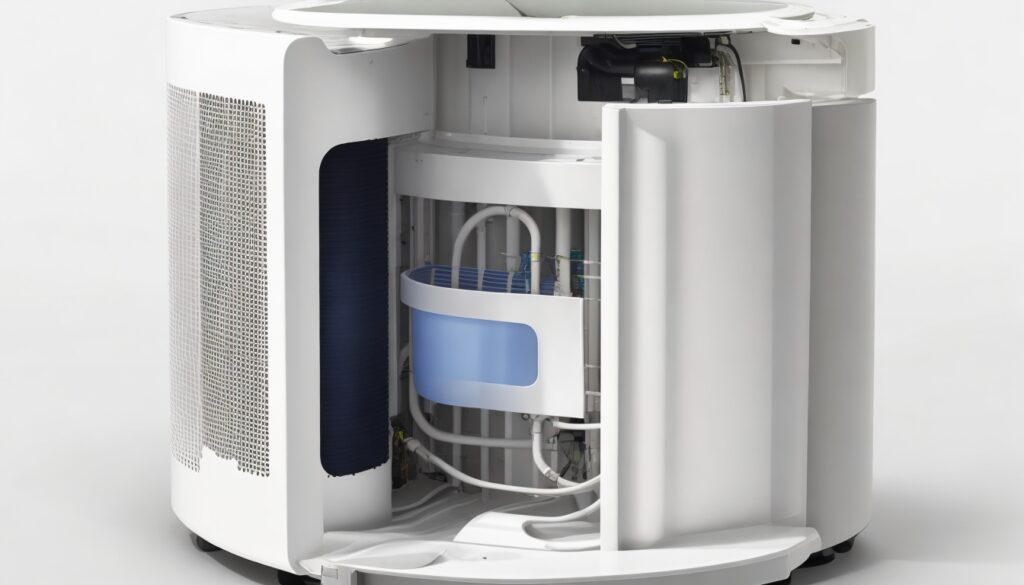
How Air Purifiers work
Air purifiers uses different technologies such as High-Efficiency Particulate Air (HEPA) filters, activated carbon filters, ionizers, and UV-C sterilization.
Air purifiers come in various forms, from portable units suitable for single rooms to whole-house systems that integrate with your HVAC system. The choice depends on your specific needs and the size of the area you want to purify.
Each type of air purifier operates using distinct mechanisms. HEPA filters trap particles, activated carbon adsorbs odors and gases, ionizers charge particles to make them easier to capture, and UV-C sterilization kills microorganisms like bacteria and viruses.
When selecting an air purifier, it’s important to consider your own requirements and the types of pollutants you want to target for. This decision will significantly impact the device’s performance in enhancing your indoor air quality.
Factors to Consider When Choosing an Air Purifier
While Choosing the right air purifier you can consider following factors. We have also provided imacts of those factors.
| Factor | Impact |
|---|---|
| Room Size | Size of the room or any area you want to purify determines the required airflow capacity of the air purifier. You need to make sure it can handle the volume of air in that space. |
| Pollutant Type | Different technologies are effective at removing specific pollutants. For example, HEPA filters are good at capturing particles, while activated carbon filters are good for odors and gases. |
| Filter Replacement | Regular maintenance is crucial for any air purifier effectiveness. Check the cost and frequency of filter replacements to avoid unexpected expenses. |
| Energy Consumption | Consider the energy efficiency of the air purifier. Look for ENERGY STAR certified models for eco friendliness. |
| Sound Levels | Noisy air prifier can irritate you. If you plan to use the air purifier in a bedroom or quiet space, pay attention to noise levels. |
If you’re curious about the different types of air purifiers and how they compare, don’t miss our detailed guide on choosing the right air purifier for your needs.

Efficacy of Air Purifiers
It’s essential to know whether these devices live up to their claims they are presenting.
Research on Air Purifier Effectiveness
Multiple studies have been conducted to assess how well these devices can improve air quality. THese Research findings often demonstrate the impact of air purifiers in reducing airborne contaminants and enhancing overall air quality. However, it’s vital to consider the specific type of pollutants addressed by the research, as different technologies excel in capturing different particles or gases.
One of the key performance indicators for air purifiers is the Clean Air Delivery Rate (CADR). The CADR value gives the device’s ability to remove specific particles like dust, pollen, or smoke. Manufacturers give CADR ratings, which can help consumers choose the right air purifier for their needs. Research often validates the CADR ratings, providing credibility to air purifier claims.
Real-World Case Studies and Testimonials
Many individuals have shared their success stories after using air purifiers in their homes or workplaces. These testimonials showws the positive impact of air purifiers on allergies, asthma, and overall well-being.
For example, someone suffering from pet allergies might notice a significant reduction in symptoms after using an air purifier equipped with a HEPA filter. Likewise, individuals with respiratory conditions may experience fewer exacerbations and improved sleep quality.
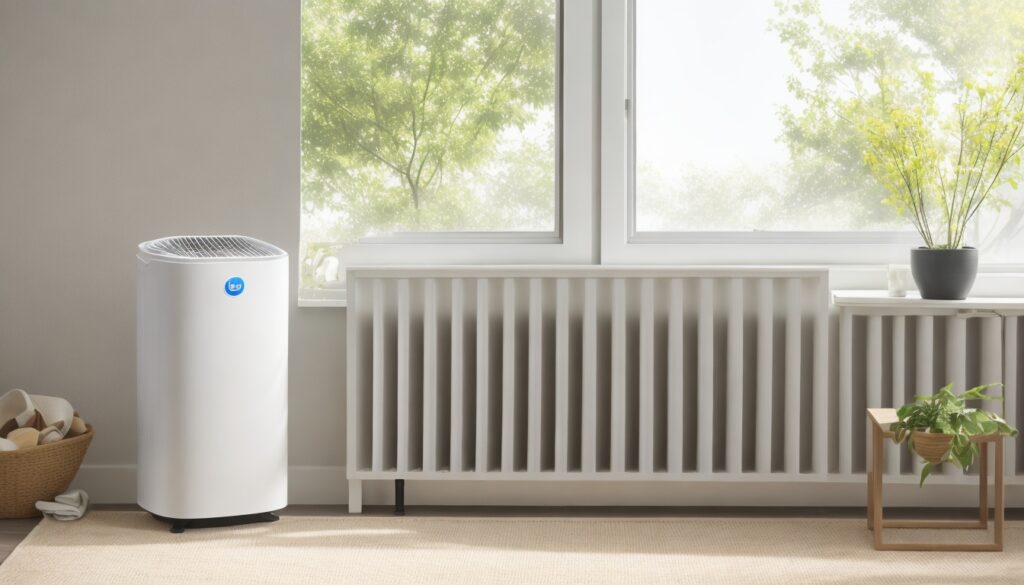
Limitations of Air Purifiers
Air purifiers do come with limitations. Understanding these limitations is good for realistic expectations and effective use. Some of the key limitations:
- Room size: Air purifiers are designed for specific room sizes. Using an air purifier with insufficient capacity for a large area may result in reduced effectiveness.
- Pollutant type: Different type of air purifier technologies are better suited for specific pollutants. For ex, HEPA filters are excellent at capturing particles but may not be as effective against odors.
So select an air purifier that matches with your specific needs and understand its capabilities and limitations. Doing so ensures that you get the most out of your investment in indoor air quality.
Benefits of Using Air Purifiers
Air purifiers can offer several benefits, including relief from allergy symptoms, elimination of unpleasant odors, reduction of airborne germs, and overall improvement of indoor air quality. They provide a much healthier and more comfortable living environment for occupants in poluted areas.
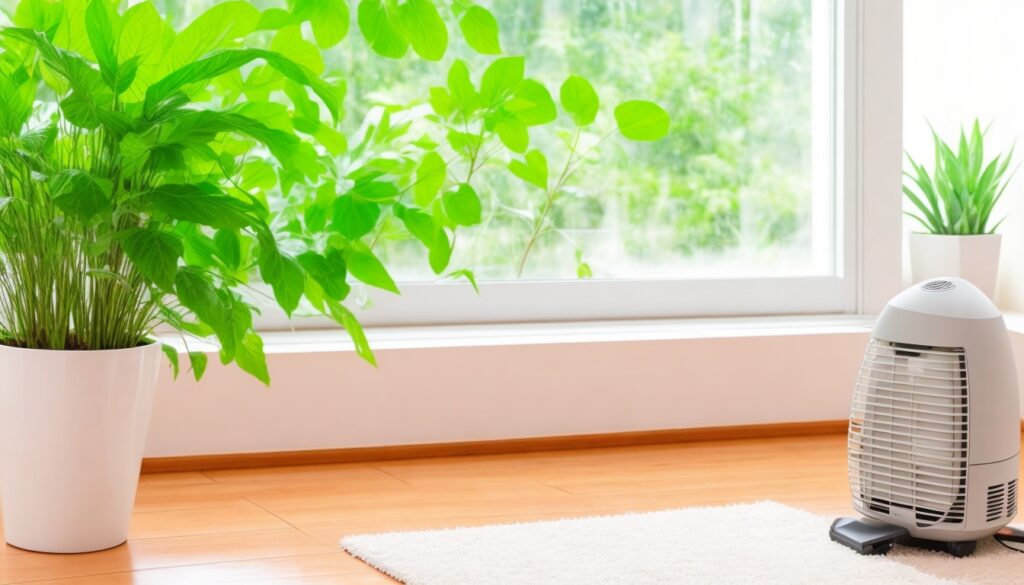
Are Air Purifiers Worth the Money?
The decision to purchase an air purifier often comes with considerations about its cost and whether it’s a worthwhile investment. To determine if air purifiers are worth the money, it’s essential to weigh the potential benefits against the expenses involved.
When deciding if an air purifier is a good investment for you, consider factors such as the prevalence of indoor air pollution in your environment and the specific health needs of your household. For those living in areas with high pollution levels or individuals with allergies, asthma, or respiratory conditions, the benefits of an air purifier can significantly outweigh the cost.
Additionally, the long-term health benefits and improved overall well-being associated with using air purifiers often make them a valuable investment. While the initial purchase and maintenance costs should be factored in, the potential health improvements and enhanced quality of life can make air purifiers a worthwhile addition to your home.
Potential Drawbacks, Disadvantages, and Considerations
Like any appliance, air purifiers come with their own set of potential drawbacks and considerations. It’s crucial to be aware of these factors to make an informed decision and get the most out of your air purifier. Here are some key considerations:
Noise Levels
Depending on the model and brand, air purifiers can produce varying levels of noise. If you plan to use an air purifier in a quiet environment, such as a bedroom or home office, the noise generated can be a significant consideration. Some units operate quietly, while others can be somewhat louder, potentially affecting your comfort and peace of mind.
Maintenance and Filter Replacement
Maintenance is a critical aspect of air purifier performance. Over time, the filters in air purifiers become saturated with captured pollutants and need replacement. The frequency of filter changes depends on factors like the air quality in your area and the specific air purifier model. It’s essential to consider the cost and availability of replacement filters to ensure ongoing effectiveness.
Initial Cost and Energy Consumption
The upfront cost of purchasing an air purifier and the associated energy consumption are key considerations. High-quality air purifiers with advanced features may come with a higher price tag, and the energy used by the device can impact your electricity bills. It’s advisable to opt for energy-efficient models, and in the long run, the health and well-being benefits often outweigh the initial expenses.
Eco-Friendliness and Sustainability Concerns
Sustainability is an increasing concern for many consumers. Some air purifiers may use filters that are not eco-friendly or produce waste that is challenging to dispose of responsibly. Choosing air purifiers with sustainable filter options or considering alternative air purification methods, such as natural air purifiers, can be a step towards a more environmentally friendly choice.
While these considerations may seem like potential drawbacks, they are essential aspects to weigh when deciding on an air purifier. By understanding the limitations and taking them into account, you can maximize the benefits of air purification while mitigating potential drawbacks.
If you’re interested in learning more about natural air purification methods as an eco-friendly alternative, be sure to check out our guide on Natural Air Purifiers.
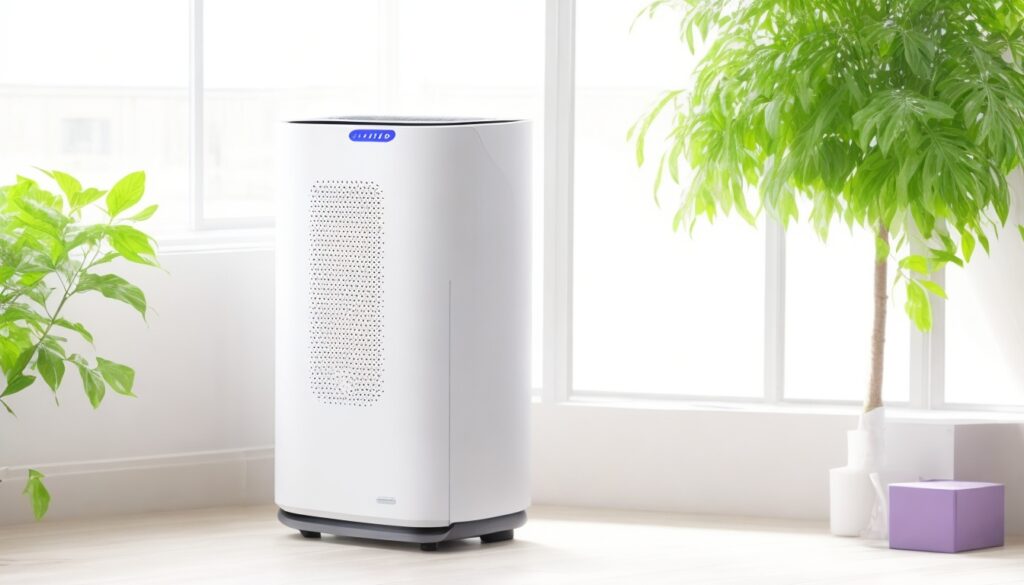
Alternatives to Air Purifiers
Air purifiers are not the only solution to improve indoor air quality. There are alternative methods and strategies that can complement or even replace the use of air purifiers. Let’s explore some of these alternatives:
Natural Air Purification Methods
Many plants or tress are exceptional at filtering and oxygenating the air in our homes. They can help remove common indoor pollutants and add a touch of greenery to your living space.
Proper ventilation is another natural method that ensures the circulation of fresh outdoor air into your home, diluting indoor pollutants. So Open your windows and also use of exhaust fans can significantly improve indoor air quality.
Behavioral Changes to Reduce Indoor Air Pollution
Adjusting your own daily habits can also play a significant role in reducing indoor air pollution. For example, avoiding smoking indoors, using exhaust fans while cooking, and being mindful of using products with strong odors can contribute to cleaner air.
Source control or eliminating the sources of pollutants, is another effective strategy. Regular cleaning and maintenance of your home, especially in areas prone to mold growth, can help prevent indoor air pollution at its source.
The Impact of Air Purifiers on Specific Health Conditions
Individuals with specific health conditions, such as allergies, asthma, or chemical sensitivities, often seek ways to manage their symptoms and improve their quality of life. Air purifiers can be valuable tools in addressing these health concerns:
Air Purifiers for Pet Allergies
Pet owners who are allergic to their furry companions can benefit from air purifiers equipped with HEPA filters. These filters effectively capture pet dander, reducing allergen levels in the home and providing relief to allergy sufferers.
Air Purifiers for Pollen and Seasonal Allergies
Seasonal allergies, triggered by pollen and outdoor allergens, can be challenging to manage. Air purifiers with HEPA filters can help keep these allergens at bay, providing a respite from allergy symptoms and improving overall comfort during allergy seasons.
Chemical Sensitivities and Air Purifiers
Individuals with chemical sensitivities often experience adverse reactions to strong odors and VOCs from household products. Air purifiers with activated carbon filters are
excellent choices for addressing chemical sensitivities. These filters adsorb odors and volatile organic compounds, providing a breath of fresh air for those with sensitivities.
Mold and Air Purifiers
Mold spores can lead to respiratory issues and allergies. Air purifiers equipped with HEPA filters are efficient at capturing mold spores and preventing their circulation in the indoor environment. This can be particularly beneficial in areas with high humidity or a history of mold problems.
For individuals with specific health concerns, choosing the right air purifier tailored to their needs can be transformative. These devices can significantly improve the quality of life by reducing the triggers and irritants associated with allergies, asthma, and chemical sensitivities.
If you’re interested in further guidance on choosing the right air purifier, don’t forget to check out our comprehensive guide on Selecting the Perfect Air Purifier.
Conclusion
Air purifiers play a very important role in improving indoor air quality and creating a healthier living environment. While they may not completely remove all pollutants, they can effectively reduce airborne particles, allergens, and odors, providing relief for allergy sufferers and promoting respiratory health.
We hope this guide has answered the question “Do air purifiers work?” and provided you with insights to make an informed decision for your home or workspace.
For more articles on air purifiers, indoor air quality, and a comprehensive air purification guide, visit our Air Purifier Stories section.
FAQ’s on Do Air Purifiers Work?
Is there a downside to air purifiers?
Yes, air purifiers are effective at reducing and capturing dust particles in the air. Air purifiers equipped with HEPA filters are particularly efficient at trapping even small dust particles, which helps keep the air cleaner and reduces dust buildup in your living space.
Do doctors recommend air purifiers?
Many doctors recommend air purifiers, especially for individuals with allergies, asthma, or other respiratory conditions. Air purifiers can help reduce exposure to allergens and irritants, leading to improved indoor air quality and better health outcomes.
Do doctors recommend air purifiers?
Yes, air purifiers offer several benefits. They can improve indoor air quality by removing allergens, dust, smoke particles, and pollutants. This can lead to reduced allergy symptoms, better respiratory health, and a generally more comfortable living environment.
Is it good to use air purifier everyday?
Yes, it is generally a good practice to use an air purifier every day, especially if you are concerned about indoor air quality. Consistent use can help maintain clean and healthy air in your home, reducing exposure to contaminants and allergens.
Is it healthy to sleep with air purifier?
Yes, it is healthy to sleep with an air purifier, provided that the device is not too noisy. Clean air can improve sleep quality and help individuals with allergies or asthma breathe more comfortably during the night. It’s important to choose a quiet model suitable for bedroom use.
Is it OK to sleep in a room with an air purifier?
Yes, it is perfectly fine to sleep in a room with an air purifier. In fact, it can be beneficial as it helps maintain clean and healthy air, potentially improving the quality of your sleep. Just ensure the purifier isn’t too noisy, as quiet operation is essential for a good night’s rest.
What works better than an air purifier?
Yes, it is perfectly fine to sleep in a room with an air purifier. In fact, it can be beneficial as it helps maintain clean and healthy air, potentially improving the quality of your sleep. Just ensure the purifier isn’t too noisy, as quiet operation is essential for a good night’s rest.
What works better than an air purifier?
When buying an air purifier, avoid models that generate ozone, as ozone can be harmful to your health. Additionally, be cautious of air purifiers with inadequate coverage for the size of the room you plan to use them in. Look for models with a HEPA filter and the CADR (Clean Air Delivery Rate) certification for optimal performance.
What works better than an air purifier?
Yes, air purifiers are effective at reducing and capturing dust particles in the air. Air purifiers equipped with HEPA filters are particularly efficient at trapping even small dust particles, which helps keep the air cleaner and reduces dust buildup in your living space.
DheerajSonwane is a dedicated writer with expertise in air purification technologies. He focuses on providing well-researched content to help readers improve indoor air quality in homes and businesses. As the lead writer at AirPurifierMaster.com, Dheeraj offers practical advice his insightful reviews guide individuals in choosing the best air purifiers for their needs.

